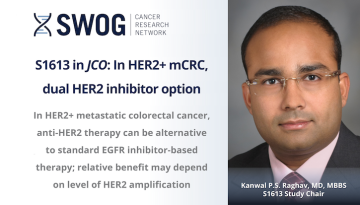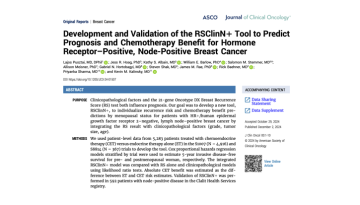A More Representative Clinical Trials Day
Today, May 20th, is Clinical Trials Day, ostensibly the date in 1747 when Scottish doctor James Lind started his trial of six interventions (including daily citrus fruit) to treat scurvy, then the bane of the British navy. Lind’s “fair test” is generally recognized as one of the earliest controlled clinical experiments in medicine and is often considered the first clinical trial.
We’ve come a long way in refining clinical trials, but as in Lind’s day, to draw valid inferences, our sample needs to carefully represent our population. Enrolling cancer trial participants who represent the full diversity of the population of patients with the given cancer is a scientific imperative. But for SWOG, the need for ensuring representative trials goes even deeper.
As a publicly funded research group, we have a higher ethical obligation not only to ensure we’re producing science that’s reliable, generalizable, and provides value to all, but also to offer all patients the opportunities clinical trials represent – top-quality health care and access to the latest investigational treatments.
To meet these scientific and ethical obligations, SWOG has undertaken a number of initiatives.
In a past update I introduced our new diversity, equity, and inclusion (DEI) champions. These five are now hard at work with their assigned committees, each initially focusing on a single trial, working with the study team to analyze the trial with an eye to making its enrollment more representative.
Here’s a list of our champions, their home committees, and the pilot studies they’re now tackling:
- Lucy Gansauer, MSN, RN, OCN, CCRP – lung committee:
Lung-MAP – our lung cancer master protocol in non-small cell lung cancer - Jessica McDermott, MD – genitourinary committee:
S1802 – adding surgery or radiation to standard therapy for metastatic prostate cancer - Gayathri Nagaraj, MD – breast committee:
S2202 – treating minimal residual disease to prevent recurrence of triple-negative breast cancer - Colmar Figueroa-Moseley, PhD, MPH – gastrointestinal committee:
S2001 – adding immunotherapy to maintenance therapy for metastatic pancreatic cancer with BRCA1 or BRCA2 mutations - Manuel Espinoza-Gutarra, MD – myeloma committee:
S2209 – testing new drug combinations for patients with myeloma who are considered too frail for a stem cell transplant
To complement the work of their DEI champions, our GU and GI committees have now identified DEI leads within their membership as well. DEI champions work to make trial populations more representative; DEI leads work to make the committees themselves more diverse – in their membership, their leadership, and their roster of study chairs.
Another key initiative is the formation of our DEI monitoring committee – an analogue of our data and safety monitoring committee, but focused on ensuring diverse representation on our studies. This group will look at issues similar to those assessed by DEI champions, but they’ll evaluate at the level of the committee rather than the individual trial.
I’m thrilled to be able to announce today that the inaugural membership of the DEI monitoring committee has just been finalized. Here it is:
- Study chair: Manmeet Ahluwalia, MD
- Site PI: Jared Acoba, MD
- Patient advocate: Joël Pointon, MSPH
- Executive officer or committee chair: Kathy Crew, MD, MS
- Recruitment & retention committee: Desiree Walker, BA
- External: Dina Lansey, MSN
- Operations: Dana Sparks, MAT
- Biostatistician: Katherine Guthrie, PhD
We expect the committee will hold its first meeting sometime in June.
We’re also nurturing great ideas from our sites. The Hope Foundation recently awarded the first two NCORP Pilot Grants, to fund NCORP projects meant to diversify trial enrollment at their institutions:
- “Expansion of a Successful Intervention to Increase NH/PI [Native Hawaiian/Pacific Islander] Accrual to Clinical Trials in an Underserved Rural Community on Oahu”
PI: Dr. Jami Fukui, University of Hawaii Cancer Center - “Improving Participation of Underrepresented Populations in Clinical Trials”
PI: Dr. William Robinson, University of Mississippi Medical Center
If you have a great idea for making trial populations at your NCORP more representative, the next deadline for the NCORP Pilot Grant Program is June 1! Here’s the request for applications.
The above initiatives grow from the brainstorming and sweat equity of many, but of three members in particular: Patricia Robinson, MD, our first DEI Fellow (recipient of our first DEI Career Development Award); Allison Caban-Holt, PhD, chair of our recruitment and retention committee; and Rick Bangs, MBA, chair of our patient advocate committee. We, and our patients, are indebted to them. We’re also grateful to Genentech for their significant and ongoing support of these efforts, which has allowed us to blaze a broader and bolder path forward.
Finally, as you celebrate Clinical Trials Day today (you will be celebrating, won’t you?), here’s a valuable item to add to your reading list: the American Society of Clinical Oncology and the Association of Community Cancer Centers have just issued a joint research statement with recommendations for increasing racial and ethnic diversity in clinical trials. The steps we’re taking are a great start, but there are lots of other promising ideas out there as well.
It’s only right that on Clinical Trials Day I close with the outcome of Dr. Lind’s clinical trial. It was ended early, because of an unusual type of interim analysis – they ran out of oranges and lemons after six days. Luckily, six days was long enough – both sailors on the citrus fruit arm were almost fully recovered. No word on AEs in the arms that got a cup of seawater or a dose of sulfuric acid each day. We can only imagine!
Other Recent Stories



